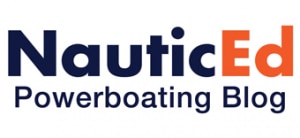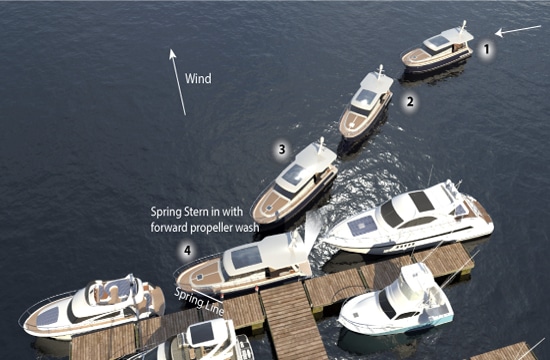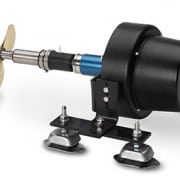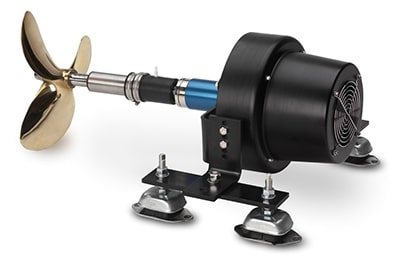Electric Drive Engines in Powerboats
Electric engines are becoming an increasingly popular choice for large powerboats as technology advances and the boating community becomes more environmentally conscious. Modern electric engines offer several advantages over traditional diesel or gasoline engines, but they also come with certain limitations, particularly regarding energy storage and range.
Latest Technology in Electric Engines
Electric drives rely upon high efficiency and energy storage batteries or an electric generator or both.
Battery Technology and Electric Motors
- Lithium-Ion Batteries: Most modern electric boats use lithium-ion batteries, which are favored for their high energy density, relatively low weight, and ability to be recharged quickly. These batteries power electric motors, which are highly efficient and provide instant torque for smooth and quiet acceleration
- Advanced Motors: The latest electric motors are often brushless and water-cooled, providing high efficiency, low maintenance, and durability, making them well-suited for marine environments. These motors can deliver substantial power while operating quietly and with fewer vibrations than internal combustion engines.
Advantages of Electric Engines
- Environmental Benefits: Electric engines produce zero emissions at the point of use, reducing the carbon footprint and eliminating pollution in the water and air. This is particularly beneficial in environmentally sensitive areas and for boaters who prioritize sustainability.
- Quiet Operation: Electric engines are much quieter than diesel or gasoline engines, enhancing the boating experience by reducing noise pollution and allowing for a more peaceful environment on the water.
- Low Maintenance: Electric motors have fewer moving parts than internal combustion engines, reducing maintenance requirements and the likelihood of mechanical failure. There are no oil changes, fuel filters, or exhaust systems to maintain, which simplifies upkeep.
Limitations of Electric Engines
- Energy Density and Range: One of the primary limitations of fully electric boats is the energy density of current battery technology. Even the best lithium-ion batteries have a lower energy density compared to diesel fuel, meaning that the range of fully electric boats is often limited. This can restrict their use to shorter day trips or situations where charging infrastructure is readily available.
- Charging Infrastructure: The availability of charging stations can be limited in some areas, especially in more remote or less-developed regions. This can make longer journeys or extended cruising challenging without careful planning.
Hybrid Electric Systems
To overcome the limitations of fully electric systems especially the need to recharge, many large powerboats are adopting hybrid electric systems that combine electric motors with a diesel generator. This approach offers several advantages:
Diesel-Electric Hybrid Systems
- Diesel Generator: In a hybrid system, a diesel generator provides electrical energy to power the electric motor and charge the batteries when the battery charge becomes low. This setup allows for extended range and the ability to operate in areas without charging infrastructure.
- Efficient Operation: The diesel generator can be operated at its most efficient power load curve, which means it runs at optimal efficiency to produce electricity. This setup is more fuel-efficient than running a diesel engine directly for propulsion, particularly at lower speeds where diesel engines are less efficient.
Simultaneous Charging and Propulsion
- Dual Functionality: The generator can charge the batteries and provide power to the electric motor simultaneously, maximizing the efficiency of fuel use. This dual functionality ensures that the batteries are always charged and ready to provide power when needed, either for quiet, emission-free cruising or as a backup if the generator fails.
The Balance Between Batteries and Diesel Fuel
- Energy Density Comparison: Diesel fuel has a much higher energy density compared to even the best battery technology. For example, a gallon of diesel fuel contains about 35.8 kilowatt-hours of energy, while a lithium-ion battery might store 0.2 kilowatt-hours per pound. This disparity means that for long-distance cruising or extended trips away from shore power, a hybrid solution makes perfect sense, providing the reliability of diesel fuel with the quiet efficiency of electric propulsion.
- Practical Applications: For short day trips or perhaps one overnight stay, a fully electric setup with lithium-ion batteries may be a perfect solution where recharging is not needed during the outing. This allows for quiet, emission-free boating and the convenience of electric power without the need for fuel.
Conclusion
The latest advancements in electric and hybrid propulsion systems are making large powerboats more versatile, efficient, and environmentally friendly. While fully electric boats are ideal for short trips and areas with good charging infrastructure, hybrid systems offer the best of both worlds for longer journeys, combining the reliability of diesel with the efficiency and quiet operation of electric motors. As battery technology continues to improve, the adoption of electric propulsion in larger boats is likely to increase, offering more options for eco-conscious boaters and those looking for a more comfortable and sustainable boating experience.




